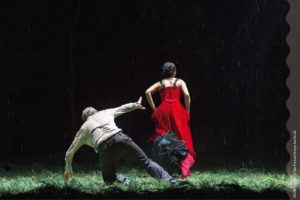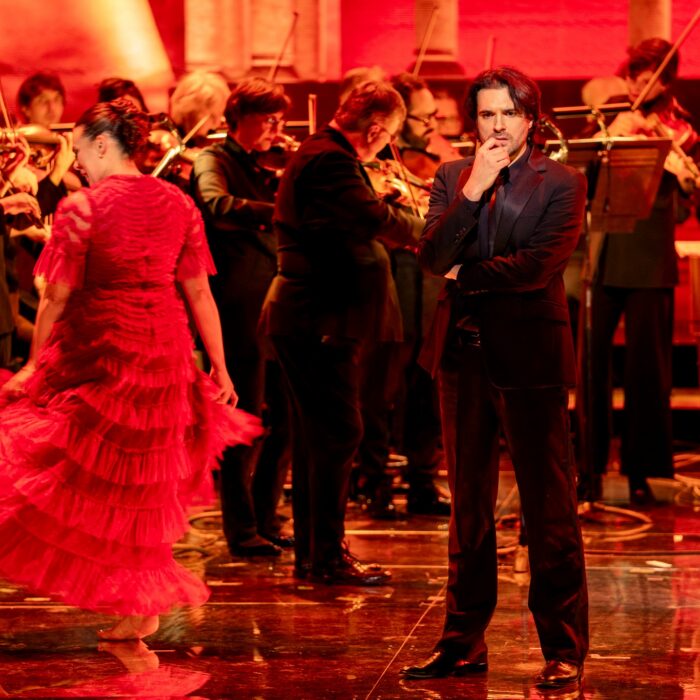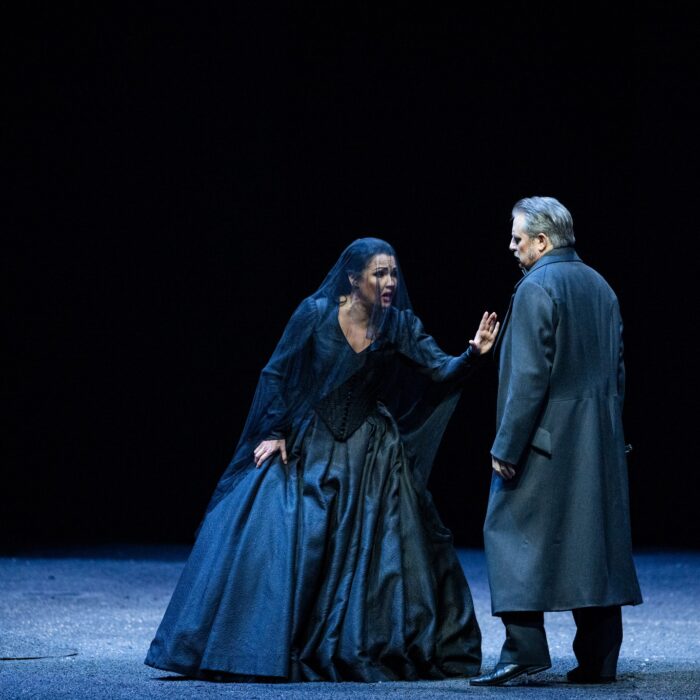
Komische Oper Berlin 2017-18 Review – Eugene Onegin: Barrie Kosky’s Rendition of Tchaikovsky Masterwork Destined to Be Remembered Forever
By Santosh VenkataramanThe Komische Oper in Berlin has soared in reputation under the leadership of Barrie Kosky for its innovative programming. It is regarded as the destination in town for rarely-performed opera works.
Scheduling an opera trip in Berlin is full of challenges and my maiden journey to the Komische was for the altogether familiar “Eugene Onegin” by Tchaikovsky on Saturday night and it was a winner on all counts. This co-production with the Opernhaus Zurich was a sparkling version which featured some of the best acting you will see in an opera with all the parts of singing, setting and orchestral music fitting in seamlessly together.
A Countryside Meadow
It begins in a huge grass field in the Russian countryside as the setting for the Larina estate. Children are playing, the elders are reminiscing, and one young couple is even enjoying a game of badminton in as idyllic a backdrop as designed by Rebecca Ringst.
Two elderly women are making jam while entertaining the simple-minded Tatiana and more exuberant Olga with tales of the past. The jars of jam will factor in much later.
While Tatiana is clad in a plain flowery blue dress, while Olga is in a more eye-catching pink ensemble, anticipating the arrival of her beau Lensky. The personality of the two women could hardly be any more different, with Olga always dancing about and Tatiana buried in books.
Lensky and his friend Onegin’s arrival highlights their differing temperaments. Olga and Lensky are in ecstasy as they sit in chairs on one side of the stage, while the indifferent Onegin wishes he were elsewhere, expressing his boredom while sitting next to the entranced Tatiana. When he takes a taste of the jam, it’s as if he is dismissive of life in the countryside along with Tatiana herself. Onegin is soon gone, but it’s this brief encounter that foreshadows the tragic events to follow.
A Letter As a Highlight
A spotlight is literally placed on Tatiana in the extended scene as she composes her love letter to Onegin in the center of the meadow. It is here that soprano Nadja Mchantaf delivers a performance that exemplifies youth with her doubts and fragility on full display. Her Tatiana was an emotional powerhouse as she vacillates on how to progress before writing the words that would create her destiny.
When she is rejected cruelly by Onegin, portrayed by veteran baritone Gunter Papendell, she runs off into the wilderness heartbroken and shattered to no end in a devastating moment.
Chilling Duel
When the foursome is next seen together on Tatiana’s name day, a festive dance marks the occasion. Tatiana is in no mood to dance as a young girl in disarray, Olga’s propensity for dancing and joy brutally come back to hurt her while the friendship between Lensky and Onegin is ripped apart at the seams. These four characters’ flaws all become visible at the same time.
Onegin makes his friend jealous by dancing with Olga, who gleefully plays along, not thinking about any consequences. The Kosky production makes clear that Onegin is guided not by any malice towards his friend, but to the gossip surrounding him as to his lack of interest in the proceedings. Meanwhile, Tatiana is hardly in the mood to celebrate upon the arrival of the Frenchman Triquet.
The angry Lensky cannot absolve his friend and a duel is the only conclusion to settle their differences after he connects with a fist to the face of Onegin. The duel is staged cleverly as a weeping Tatiana is seen in the foreground in a departure from regular versions of this opera. The men retreat to the background where a single shot fired is heard but not seen with a downtrodden Onegin emerging to say that his friend has been killed.
Superb Finish
Rather than begin with the main character in a ball lamenting his wasted life, Kosky places Onegin in a home that is slowly taken apart as he sings – much like his life has come apart. It was practical for the set change and cleverly undertaken, especially when Onegin gets off a couch just moments before it is moved offstage.
The palace scene sees the disheveled Onegin mocked by the public on his return home. He meets the awkward Prince Gremin and sees that Tatiana is now radiant in a flowing red dress as a woman of supreme confidence. Bass Onay Kose as Gremin rises to the occasion with his declaration of love for his wife, whose presence stuns the visitor.
When Onegin and Tatiana are seen together again, it is back in that same meadow. The tension is unmistakable as she tells him they have no future as a couple and rains fall to heighten the circumstances. A kiss by Tatiana only adds to the wounds of Onegin, who now experiences the same feeling of despair in the same location that Tatiana had before.
Tremendous Team
Mchantaf and Papendell as the two leads completely encompass their roles. The veteran Papendell is young-looking enough to make his Onegin impetuous and cynical while at the same time eliciting great empathy as the most damaged character of them all. The baritone has a natural haughtiness to his voice that works tremendously in this role.
The tenor Adrian Strooper is a quick-trigger Lensky. His showpiece aria “Kuda, Kuda” featured intensity and balance as the friendship with Onegin dissolves. Mezzo-soprano Maria Fiselier was passionate and energetic with her Olga.
While the cast worked wonders collectively, the star may have been maestro Jordan de Souza. The Kapellmeister at KOB guided a Komische Oper orchestra that formed a luminous sound with Tchaikovsky’s score. One’s heart was pulled along with every melody under the baton of de Souza, who should be heard from in the future.
The spectacular Barrie Kosky production of Eugene Onegin figures to go down as one of the beloved versions of this work. Seeing it performed in the intimate setting of the Komische Oper with a cast and setting that fully understood the nuances of this masterpiece was a delight to be savored.


